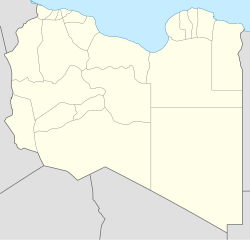Sokna
| سوكنة (Sokna) | ||
|---|---|---|
|
|
||
| Coordinates | 29 ° 4 ' N , 15 ° 47' E | |
| Basic data | ||
| Country | Libya | |
| al-Jufra | ||
| ISO 3166-2 | LY-JU | |
| Residents | 9800 | |
Sokna ( Arabic سوكنة, also transliterated as Socna or Sawknah) is an oasis city in the Sahara in the Fezzan region in southwest Libya . Administratively, the city belongs to the Munizip al-Dschufra , the district in the middle of the ancient Arab Empire with the capital Hon .
history
After the Italo-Turkish War , Italy occupied the two parts of the country, Cyrenaica and Tripolitania, in Libya and annexed them as a colony of Italian Libya . The war criminal and later “Viceroy of Italian East Africa” Rodolfo Graziani conquered Sokna from February 13-14, 1928 in his function as infantry general .
During the Italian occupation of Libya, the district capital Hon was the administrative seat of the Fezzan region, which the Italians called the "Territorio del Sahara Libico" .
During the time under Muammar al-Gaddafi , the city was linked to the wars of liberation against the Italian colonial power. In 1982 the Libyan Jamahiriya (Libyan People's Republic) issued a stamp from the series “Battles of Libya” under the title “Battle of Sokna”.
language
Sokna is also the name of a Berber language (Tuarek) that was spoken in the oasis city. The language was spoken exclusively in Fuquahara in northeast Fezzan and in Sokna. According to research by Václav Blažek (1999), Sokna was also spoken in the Tmessa oasis.
Many Arabs now live in the city and a lot of Arabic is spoken. However, the Berber language is still present in old names of places and squares.
geography
Sokna is 16.5 km (10.3 miles) from the county capital, Hon. The fountains of the oasis let date palms flourish.
reception
Sokna is taken up by Karl May in a story from 1878 . In “The Rose of Sokna” the first-person narrator learns after a trip to Murzuk that the daughter of his host, “Manasse Ben Aharab”, was stolen. The leader of a Berber tribe (with the fancy name "Gum") demands ransom ("10 bags of gold"). The European, white hero succeeds with his Arab servant "Ali" to find the hiding place of the tribe, to capture the leader and of course to bring the beautiful Rahel ("Rose of Sokna") back to her father. Karl May was never in Libya.
Individual evidence
- ^ Libya: Stamps (Series: Resistance Battles) (1/2). In: colnect.com. Retrieved April 26, 2016 .
- ↑ The Rose of Sokna - Karl-May-Wiki. In: karl-may-wiki.de. Retrieved April 26, 2016 .
